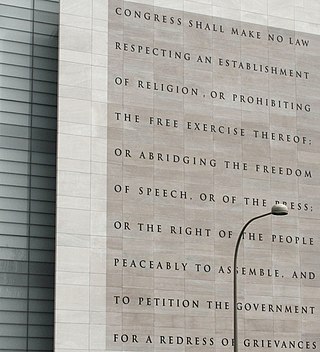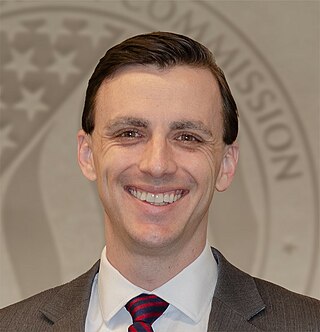Related Research Articles

The Foundation for Individual Rights and Expression (FIRE), formerly called the Foundation for Individual Rights in Education, is a 501(c)(3) non-profit civil liberties group founded in 1999 with the mission of protecting freedom of speech on college campuses in the United States. FIRE changed its name in June 2022, when it broadened its focus from colleges to freedom of speech throughout American society.
The Faurisson affair was an academic controversy following publication of a book, Mémoire en défense (1980), by French professor Robert Faurisson, a Holocaust denier, and the inclusion of an essay by American linguist Noam Chomsky, entitled "Some Elementary Comments on the Rights of Freedom of Expression", as an introduction to Faurisson's book.
Academic freedom is the right of a teacher to instruct and the right of a student to learn in an academic setting unhampered by outside interference. It may also include the right of academics to engage in social and political criticism.

In the United States, freedom of speech and expression is strongly protected from government restrictions by the First Amendment to the U.S. Constitution, many state constitutions, and state and federal laws. Freedom of speech, also called free speech, means the free and public expression of opinions without censorship, interference and restraint by the government The term "freedom of speech" embedded in the First Amendment encompasses the decision what to say as well as what not to say. The Supreme Court of the United States has recognized several categories of speech that are given lesser or no protection by the First Amendment and has recognized that governments may enact reasonable time, place, or manner restrictions on speech. The First Amendment's constitutional right of free speech, which is applicable to state and local governments under the incorporation doctrine, prevents only government restrictions on speech, not restrictions imposed by private individuals or businesses unless they are acting on behalf of the government. The right of free speech can, however, be lawfully restricted by time, place and manner in limited circumstances. Some laws may restrict the ability of private businesses and individuals from restricting the speech of others, such as employment laws that restrict employers' ability to prevent employees from disclosing their salary to coworkers or attempting to organize a labor union.

Robert Maynard Hutchins was an American educational philosopher. He was president (1929–1945) and chancellor (1945–1951) of the University of Chicago, and earlier dean of Yale Law School (1927–1929). His first wife was the novelist Maude Hutchins. Although his father and grandfather were both Presbyterian ministers, Hutchins became one of the most influential members of the school of secular perennialism.

The American Association of University Professors (AAUP) is an organization of professors and other academics in the United States. AAUP membership includes over 500 local campus chapters and 39 state organizations.

PEN America, founded in 1922, and headquartered in New York City, is a nonprofit organization whose goal is to raise awareness for the protection of free expression in the United States and worldwide through the advancement of literature and human rights. PEN America is the largest of the more than 100 PEN centers worldwide that together compose PEN International. PEN America has offices in New York City, Los Angeles, Washington, D.C., and since late 2023 also in Florida.

Robert Jeffrey Zimmer was an American mathematician and academic administrator. From 2006 until 2021, he served as the 13th president of the University of Chicago and as the Chair of the Board for Argonne National Lab, Fermi National Accelerator Laboratory, and the Marine Biological Laboratory. He then served as chancellor of the University of Chicago until July 2022. As a mathematician, Zimmer specialized in geometry, particularly ergodic theory, Lie groups, and differential geometry.
The Library Bill of Rights is the American Library Association's statement expressing the rights of library users to intellectual freedom and the expectations the association places on libraries to support those rights. The Association's Council has adopted a number of interpretations of the document applying it to various library policies.

The term safe space refers to places "intended to be free of bias, conflict, criticism, or potentially threatening actions, ideas, or conversations". The term originated in LGBTQ culture, but has since expanded to include any place where a marginalized minority can come together to communicate regarding their shared experiences. Safe spaces are most commonly located on university campuses in the western world, but also are at workplaces, as in the case of Nokia.
Pond and Pond was an American architecture firm established by the Chicago architects Irving Kane Pond and Allen Bartlitt Pond.
The Jefferson Muzzle Awards are an award given in the United States by the Thomas Jefferson Center for the Protection of Free Expression to people who are perceived to undermine freedom of speech.
The issue of school speech or curricular speech as it relates to the First Amendment to the United States Constitution has been the center of controversy and litigation since the mid-20th century. The First Amendment's guarantee of freedom of speech applies to students in the public schools. In the landmark decision Tinker v. Des Moines Independent Community School District, the U.S. Supreme Court formally recognized that students do not "shed their constitutional rights to freedom of speech or expression at the schoolhouse gate".
The Jewish community of Oslo et al. v. Norway was a case decided by the UN Committee on the Elimination of Racial Discrimination in 2005.
Intellectual freedom encompasses the freedom to hold, receive and disseminate ideas without restriction. Viewed as an integral component of a democratic society, intellectual freedom protects an individual's right to access, explore, consider, and express ideas and information as the basis for a self-governing, well-informed citizenry. Intellectual freedom comprises the bedrock for freedoms of expression, speech, and the press and relates to freedoms of information and the right to privacy.

The AMCHA Initiative is a non-advocacy group that combats antisemitism on campuses through investigation, documentation, and education in order to protect Jewish students from assault and fear. In that capacity, it has sought to undermine BDS activities on campuses. AMCHA was founded in 2012 by University of California Santa Cruz lecturer Tammi Rossman-Benjamin and University of California Los Angeles Professor Emeritus Leila Beckwith. The term Amcha is Hebrew for "your people" or "your nation."
The current campaign for an academic boycott of Israel was launched in April 2004 by the Palestinian Campaign for the Academic and Cultural Boycott of Israel (PACBI) as part of the Boycott, Divestment and Sanctions (BDS) campaign. The campaign calls for BDS activities against Israel to put international pressure on Israel, in this case against Israeli academic institutions, all of which are said by PACBI to be implicated in the perpetuation of Israeli occupation, in order to achieve BDS goals. Since then, proposals for academic boycotts of particular Israeli universities and academics have been made by academics and organisations in Palestine, the United States, the United Kingdom, and other countries. The goal of the proposed academic boycotts is to isolate Israel in order to force a change in Israel's policies towards the Palestinians, which proponents argue are discriminatory and oppressive, including oppressing the academic freedom of Palestinians.

Media freedom in the European Union is a fundamental right that applies to all member states of the European Union and its citizens, as defined in the EU Charter of Fundamental Rights as well as the European Convention on Human Rights. Within the EU enlargement process, guaranteeing media freedom is named a "key indicator of a country's readiness to become part of the EU".
Lindsay Shepherd is a Canadian columnist who became known for her involvement, as a graduate student and teaching assistant, in an academic freedom controversy at Wilfrid Laurier University (WLU) in Waterloo, Ontario, in 2017.

Sean Joseph Cooksey is a Commissioner and the current Chairman of the Federal Election Commission.
References
- 1 2 "Adopting the Chicago Statement". thefire.org. Foundation for Individual Rights and Expression (FIRE) . Retrieved 21 May 2023.
- 1 2 3 4 5 Zimmer, Robert J.; Isaacs, Eric D.; et al. "Report of the Committee on Freedom of Expression" (PDF). uchicago.edu. Committee on Freedom of Expression at the University of Chicago. Retrieved 31 July 2018.
- ↑ "FIRE launches campaign in support of University of Chicago Free Speech Statement". thefire.org. September 2015. Retrieved 2019-03-16.
- 1 2 "Chicago Statement: University and Faculty Body Support". www.thefire.org. 2022-04-05. Retrieved 2024-09-26.
- 1 2 "Purdue adopts 'Chicago principles' to protect free speech". chicagotribune.com. 3 May 2015. Retrieved 2017-03-29.
- ↑ "Opening inquiry | The University of Chicago Magazine". mag.uchicago.edu. Retrieved 2017-03-29.
- 1 2 Kingkade, Tyler (2015-05-15). "Purdue Takes A Stand For Free Speech, No Matter How Offensive Or Unwise". Huffington Post. Retrieved 2017-03-29.
- ↑ Grieve, Pete. "University to Freshmen: Don't Expect Safe Spaces or Trigger Warnings". Chicago Maroon. Retrieved 2023-10-22.
- ↑ "Freedom of Expression". Wilfried Laurier University. Retrieved 2024-03-09.
- ↑ "Against Endorsing the Chicago Principles". InsideHigherEd. 11 Dec 2018. Retrieved 2019-03-16.
- ↑ "Freedom of Expression Resolution Based on University of Chicago Statement". thefire.org. 3 Apr 2018. Retrieved 2019-03-16.
- ↑ "When "Free Speech" Is a Marketing Ploy". slate.com. 23 Mar 2018. Retrieved 2019-03-16.
- ↑ "What University Of Chicago Students Think Of Their School's Campaign Against 'Safe Spaces'". ThinkProgress. 27 Aug 2016. Retrieved 2019-03-16.